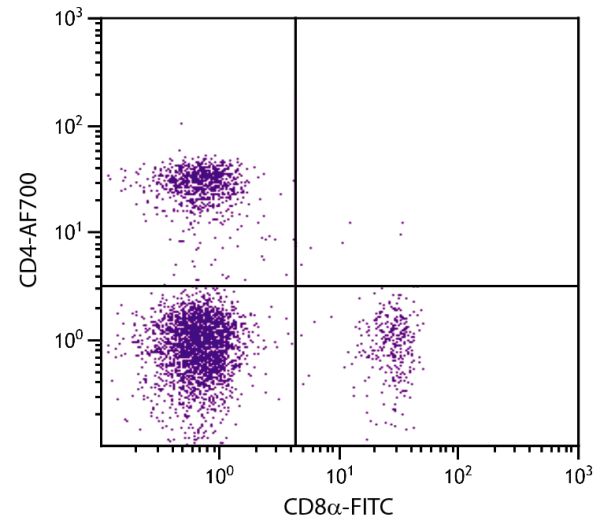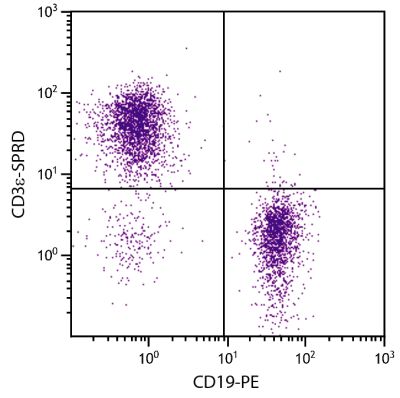Rat Anti-Mouse CD4-AF700 (GK1.5)
Cat. No.:
1540-27
Alexa Fluor® 700 Anti-Mouse CD4 antibody for use in flow cytometry assays.
$230.00


| Clone | GK1.5 |
|---|---|
| Isotype | Rat (Lewis) IgG2bκ |
| Isotype Control | Rat IgG2b-AF700 (KLH/G2b-1-2) |
| Specificity | Mouse CD4 |
| Alternative Names | L3T4, Ly-4 |
| Description | CD4 is a type I transmembrane glycoprotein expressed on most thymocytes and the helper/inducer subpopulation of mature T lymphocytes of all mouse strains tested. CD4 has also been detected at low density on pluripotent hematopoietic stem cells, bone marrow myeloid precursors, and intrathymic lymphoid precursors. The CD4 antigen functions as a co-receptor, interacting with class II major histocompatability complex (MHC) molecules in the recognition of foreign antigens by T cells. In vivo and in vitro treatment with the GK1.5 monoclonal antibody effectively depletes CD4+ cells. GK1.5 also blocks helper T cell responses to MHC class II antigens, including cytolysis, proliferation, allogeneic B cell help, and release of lymphokines. |
| Immunogen | Mouse CTL clone V4 |
| Conjugate | AF700 (Alexa Fluor® 700) |
| Buffer Formulation | Phosphate buffered saline containing < 0.1% sodium azide |
| Clonality | Monoclonal |
| Concentration | 0.5 mg/mL |
| Volume | 0.2 mL |
| Recommended Storage | 2-8°C; Avoid exposure to light |
| Trademark Information | Alexa Fluor® is a registered trademark of Thermo Fisher Scientific, Inc. or its subsidiaries |
| Applications |
Flow Cytometry – Quality tested 1,5,7,11-15 Immunohistochemistry-Frozen Sections – Reported in literature 2-4 Immunocytochemistry – Reported in literature 5 Immunoprecipitation – Reported in literature 1 Depletion – Reported in literature 1,7,8 Separation – Reported in literature 6,9,10 Blocking – Reported in literature 1,8 |
| RRID Number | AB_2794844 |
| Gene ID |
12504 (Mouse) |
| Gene ID Symbol |
Cd4 (Mouse) |
| Gene ID Aliases | L3T4; Ly-4 |
| UniProt ID |
P06332 (Mouse |
| UniProt Name |
CD4_MOUSE (Mouse) |
Documentation
Certificate of Analysis Lookup
Enter the Catalog Number and Lot Number for the Certificate of Analysis you wish to view
- 1. Dialynas DP, Quan ZS, Wall KA, Pierres A, Quintáns J, Loken MR, et al. Characterization of the murine T cell surface molecule, designated L3T4, identified by monoclonal antibody GK1.5: similarity of L3T4 to the human Leu-3/T4 molecule. J Immunol. 1983;131:2445-51. (Immunogen, FC, IP, Depletion, Block)
- 2. Delong P, Tanaka T, Kruklitis R, Henry AC, Kapoor V, Kaiser LR, et al. Use of cyclooxygenase-2 inhibition to enhance the efficacy of immunotherapy. Cancer Res. 2003;63:7845-52. (IHC-FS)
- 3. Xia RH, Yosef N, Ubogu EE. Clinical, electrophysiological and pathologic correlations in a severe murine experimental autoimmune neuritis model of Guillain-Barré syndrome. J Neuroimmunol. 2010;219:54-63. (IHC-FS)
- 4. Kosuge H, Ishihara T, Haraguchi G, Maejima Y, Okada H, Saiki H, et al. Treatment with telmisartan attenuates graft arteriosclerosis in murine cardiac allografts. J Heart Lung Transplant. 2010;29:562-7. (IHC-FS)
- 5. Choi J, Oh S, Lee D, Oh HJ, Park JY, Lee SB, et al. Mst1-FoxO signaling protects naïve T lymphocytes from cellular oxidative stress in mice. PloS One. 2009;4(11):e8011. (ICC, FC)
- 6. Alari-Pahissa E, Vega-Ramos J, Zhang J, Castaño AR, Turley SJ, Villadangos JA, et al. Differential effect of CD69 targeting on bystander and antigen-specific T cell proliferation. J Leukoc Biol. 2012;92:145-58. (Sep)
- 7. Grodeland G, Mjaaland S, Roux KH, Fredriksen AB, Bogen B. DNA vaccine that targets hemagglutinin to MHC class II molecules rapidly induces antibody-mediated protection against influenza. J Immunol. 2013;191:3221-31. (Depletion, FC)
- 8. Ye X, Robinson MB, Pabin C, Batshaw ML, Wilson JM. Transient depletion of CD4 lymphocyte improves efficacy of repeated administration of recombinant adenovirus in the ornithine transcarbamylase deficient sparse fur mouse. Gene Ther. 2000;7:1761-7. (Depletion, Block)
- 9. Travers H, Anderson G, Gentle D, Jenkinson E, Girdlestone J. Protocols for high efficiency, stage-specific retroviral transduction of murine fetal thymocytes and thymic epithelial cells. J Immunol Methods. 2001;253:209-22. (Sep)
- 10. Vega-Ramos J, Alari-Pahissa E, del Valle J, Carrasco-Marín E, Esplugues E, Borràs M, et al. CD69 limits early inflammatory diseases associated with immune response to Listeria monocytogenes infection. Immunol Cell Biol. 2010;88:707-15. (Sep)
- 11. Avagyan S, Glouchkova L, Choi J, Snoeck H. A quantitative trait locus on chromosome 4 affects cycling of hematopoietic stem and progenitor cells through regulation of TGF-β2 responsiveness. J Immunol. 2008;181:5904-11. (FC)
- 12. Barnes MJ, Krebs P, Harris N, Eidenschenk C, Gonzalez-Quintal R, Arnold CN, et al. Commitment to the regulatory T cell lineage requires CARMA1 in the thymus but not in the periphery. PloS Biol. 2009;7(3):e1000051. (FC)
- 13. Safari D, Dekker HA, Rijkers G, Snippe H. Codelivery of adjuvants at the primary immunization site is essential for evoking a robust immune response to neoglycoconjugates. Vaccine. 2011;29:849-54. (FC)
- 14. Berge T, Grønningsæter IH, Lorvik KB, Abrahamsen G, Granum S, Sundvold-Gjerstad V, et al. SH2D2A modulates T cell mediated protection to a B cell derived tumor in transgenic mice. PLoS One. 2012;7(10):e48239. (FC)
- 15. Jacobsen J, Haabeth OW, Tveita AA, Schjetne KW, Munthe LA, Bogen B. Naive idiotope-specific B and T cells collaborate efficiently in the absence of dendritic cells. J Immunol. 2014;192:4174-83. (FC)
See All References




